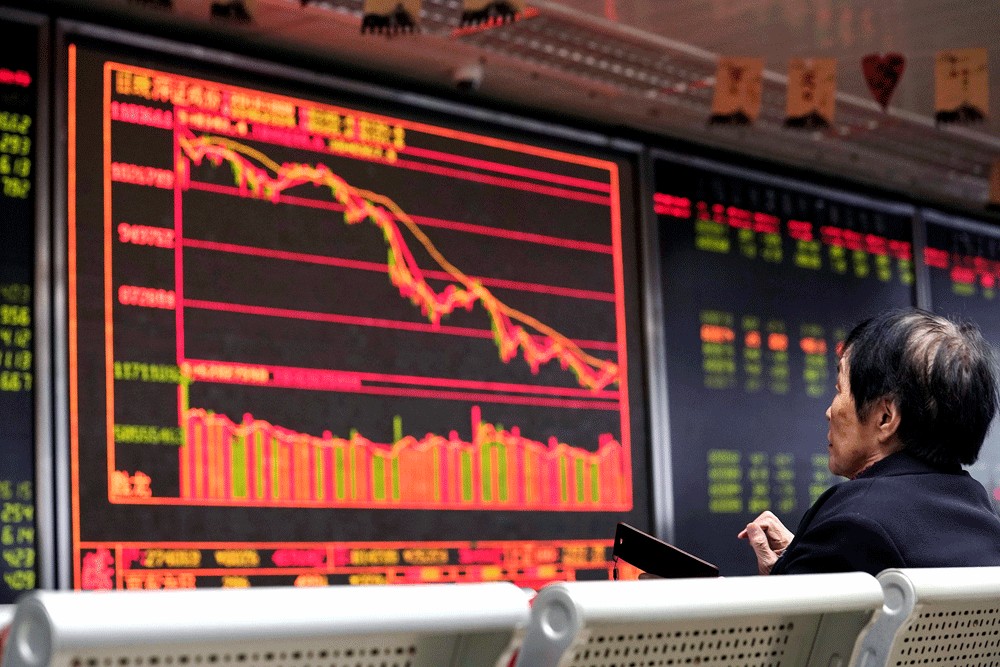Popular Reads
Top Results
Can't find what you're looking for?
View all search resultsPopular Reads
Top Results
Can't find what you're looking for?
View all search resultsIMF lowers China 2019 growth forecast, citing trade war
Change text size
Gift Premium Articles
to Anyone
 An investor watches a board showing stock information at a brokerage office in Beijing, China, on Monday. The nation’s equity market had already lost US$2.4 trillion in value since January before Monday amid signs that deleveraging and a trade spat with the US is hurting economic growth. (Reuters/Jason Lee )
An investor watches a board showing stock information at a brokerage office in Beijing, China, on Monday. The nation’s equity market had already lost US$2.4 trillion in value since January before Monday amid signs that deleveraging and a trade spat with the US is hurting economic growth. (Reuters/Jason Lee )
T
he International Monetary Fund on Tuesday lowered its forecast for Chinese economic growth in 2019, saying the escalating trade war with the United States will drag on the world's second-largest economy.
The IMF's latest World Economic Outlook predicted China's economy would grow 6.2 percent next year, down from an early forecast of 6.4 percent, citing the "negative effect of recent tariff actions".
Both of those figures would mark the slowest rate of expansion for China since 1990, when growth shuddered in the aftermath of the violent suppression of massive Tiananmen Square pro-democracy demonstrations the previous year.
But the IMF, which released its predictions for the world economic system at its annual meeting in Bali, Indonesia, warned that China's economy could decelerate further if the trade conflict deepens.
"The forecast does not incorporate the impact of further tariffs on Chinese and other imports threatened by the United States, but not yet implemented, due to uncertainty about their exact magnitude, timing, and potential retaliatory response," the IMF said.
China's rate of growth could decline by as much as a full percentage point or more by 2019 if a "worst-case" scenario materialises, involving further tariffs, a commensurate Chinese counter-response and a collapse in confidence by businesses and markets.
While saying Chinese growth "remained strong", the IMF added that Beijing policymakers were navigating a "difficult trade-off between growth and stability".
China is trying to move away from its long-time reliance on heavy industry and manufactured exports towards a growth model based more on domestic consumption by its increasingly wealthy populace.
But the already tricky transition has been complicated by US President Donald Trump's use of import tariffs to punish China for what he considers predatory trade practices.
The trade war has already forced China to moderate its own tough campaign to crack down on excessive credit, initiated following growing warnings that it was sitting on a debt time bomb.
It has recently taken a more accommodating stance to help buffer China's economy from the US trade measures.
The IMF warned Beijing not to completely shelve the debt clean-up and other regulatory reforms, saying that could "encourage risk-taking, leading to a further buildup of financial vulnerabilities".
The IMF maintained a previous forecast for growth of 6.6 percent for 2018. China's economy grew 6.9 percent in 2017.
The fund also slightly lowered its forecast for Japan's economy to 1.1 percent growth in 2018, down 0.1 of a percentage point from an April estimate, but maintained a prediction for a 0.9 percent Japanese expansion in 2019.
Growth is expected to "remain strong elsewhere in emerging and developing Asia", the IMF said, forecasting Indian growth to increase to 7.3 percent in 2018 and 7.4 percent in 2019.
But it said the trade uncertainty would impact the ASEAN-5 -- Indonesia, Malaysia, the Philippines, Thailand, and Vietnam.
It maintained a 5.3 percent growth forecast for the Southeast countries in 2018, but lowered the 2019 estimate slightly to 5.2 percent.









